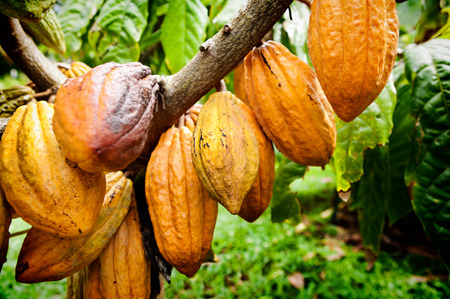Commerz Upbeat on Prices of Cocoa and – for now – Arabica Coffee Too
Category: Cocoa
 (Agrimoney) – Commerzbank issued upbeat calls on futures of cocoa and – for now – arabica coffee futures, saying that selling had gone too far, even as it cut its prices forecasts on both commodities, and on sugar too.
(Agrimoney) – Commerzbank issued upbeat calls on futures of cocoa and – for now – arabica coffee futures, saying that selling had gone too far, even as it cut its prices forecasts on both commodities, and on sugar too.
The bank – while downgrading its forecasts for New York-traded cocoa futures, on a quarter-average basis by $200 a tonne across the board – left the figures well above levels that investors are factoring in.
For the last three months of this year, for instance, Commerzbank forecast futures averaging $2,000 a tonne, compared with the $1,886 a tonne at which the December contract was trading on Friday.
The New York market does not see futures crossing back above $2,000 a tonne until early 2019.
‘Skeptical over ICCO worries’
The upbeat forecast reflected doubts over a forecast by the International Cocoa Organization in March that the market has “entered a period of structural surplus that is likely to last for some time to come” – a statement viewed as fueling a slump in prices earlier this year to a near-10-year low.
Commerzbank said: “We are skeptical that the ICCO’s concerns about a period of structural surpluses on the cocoa market are justified,” flagging the dent from low prices to production prospects.
“Growers have less money available for the maintenance of their plantations.
“Also, price-sensitive demand could surprise to the upside, just like it was previously depressed by the high price levels.”
The bank said that “we do not expect the price slump to continue. In the coming year, the cocoa price should continue its moderate recovery.”
Another deficit?
For arabica coffee too, Commerzbank cut its price forecasts but to levels, for now at least, above those expected by investors.
“The prospect of another deficit on the coffee market should support prices,” flagging International Coffee Organization estimates of shortfalls totaling nearly 11m tonnes from 2014-15 to 2016-17.
“The coffee market could still be in deficit even in 2017-18,” with the prospect of a smaller arabica harvest in Brazil, in an “off” year in its two-year cycle, sapping production prospects while “demand looks set to continue rising”.
Although cutting its forecast for arabica coffee futures by up to 15 cents a pound, its estimate for prices averaging 140 cents a pound in the October-to-December period was well above the 131.30 cents a pound that New York’s December contract was trading at on Friday.
Currency headwind
However, the bank was less upbeat in its outlook on prices for 2018, seeing them end next year at about 130 cents a pound compared with the 142.60 cents a pound priced in by the December 2018 contract.
“Prospects of a higher Brazilian crop should ensure a moderate decline of coffee prices next year,” with the country returning to an “on” year in its cycle.
Furthermore, the Brazilian real is poised for a further decline, the bank believes, so undermining values in dollar terms in which the South American country is a major player.
“By year-end, and also in 2018, our foreign exchange analysts expect a further depreciation trend of the real, and so we are likely to see further pressure on coffee prices from this side.”
Sugar price outlook
The prospect of weakness in the real also represents a further “headwind” to prices of sugar too, in which Brazil is also the top producer and exporter.
Oil markets too look likely to continue to weigh on prices, in remaining weak, so cutting values of ethanol, and in turn dampening values of sugar, which competes with ethanol for cane.
“Since we expect no notable recovery of the oil price in the remainder of this year, this adverse factor remains in place for the time being,” the bank said, cutting its forecast for New York raw sugar prices by up to 4.0 cents a pound.
The downgrades left the forecasts roughly in line with the futures curve, with values now expected, for instance, to average 14.0 cents a pound in the last three months of this year
On the more supportive side for prices, Commerzbank said that “high speculative net short positions suggest that a lot of bearish news has already been priced in”, and that “Brazilian producers could react to any further decline of the sugar price by shifting to ethanol production”.

